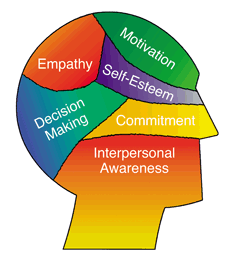Posts
Showing posts from February, 2011
Emotional intelligence (EQ)
- Get link
- Other Apps

For years people have been judged by their IQ (Intelligence Quotient). Many have lost jobs and been forced out of the business world for lack of intelligence. I don’t think it is fair but true. Success is not solely based on IQ or even conventional intelligence in the workplace. A relatively new behavioral model shows prominence in many business strategies, Emotional Intelligence (EQ) is one of them. The early theories were developed in the 1970’s and 80’s by famed psychologists Howard Gardner from Harvard and Peter Salovey of Yale with John Mayer of New Hampshire. Their work suggests that emotional intelligence is important to organizational development with regard to developing people. By understanding people’s behaviors and attitudes, it is more likely to offer insight and understanding to their roles in the organization and help to determine ways in which they can be more successful. Emotional Intelligence is significant in the workplace from recruitment to customer services techni
Social Services Worker?
- Get link
- Other Apps
Team Leader? Activity Leaders? Mentor? Program Coordinator? Social Services Worker - A name by any other name is still a social worker How many executive and management leaders in the field of social services can really say beyond the shadow of a doubt that your program goals are being met 100%? Who can say that services are being delivered 100% by your line staff the way they should be? Are your grant requirements being met? How close does your staff come to aligning their behaviors with the company mission statement outside of the annual all-staff meeting? Let’s face it, with paperwork, grant-seeking and writing, board meetings, philanthropic negotiations and advocacy … state meetings … federal meetings, staff meetings and the list can go on and on and on; who has the time to supervise the front line staff? Sure you trust your on-site supervisors but again, let’s face facts, with today’s economy and the fear of losing one’s job, how much are they really telling you? Leadership has b
Team-building: Agree to Disagree
- Get link
- Other Apps
FACT: Teams are hard to manage. FACT: Disagreement within teams is inevitable. When people with distinct styles and ideas come together to tackle complex challenges, opposition is bound to surface. Sometimes conversations about differences become defensive. Differences that breed a climate of distrust can lead to cohesion and performance spiraling downward very fast. While disagreement is unavoidable, stagnation is not! What do you do next? Would you believe that high performing teams actually thrive on difference? It’s true. A team with multiple voices and diversity of style and talent can move us toward a team-approved solution much quicker. How does a team move from discord to some sense of harmony? This transformation emerges from a fundamental shift in focus: from deficits to strengths, problems to possibilities, criticism to appreciation. The guiding question moves from "What's wrong, how do we fix it"? to "What's great, how do we do it even more
Achieving Your Goals
- Get link
- Other Apps
Achieving your goals means challenging yourself and overcoming obstacles. Even the most dedicated of us hard-working folk rarely succeed on our own. We all need expert help from time to time. DVA Leadership & Development Consultants offer that help to organizations in need. Our reputation is built on helping organizations like yours defy the odds and be more successful. With the right skills and training, you can meet challenges that will allow you to overcome those obstacles. Leadership and Team Develoment for managers gives you the skill you need to inspire your staff to achieve team goals. - Assess your current leadership performance - Identify the most effective leadership styles for your team - Develop a motivated workforce - Learn new coaching techniques Contact DVA today for more information and to schedule your Leadership and Team Development Training for Managers
Youth Training Series: Bullying and Intimidation
- Get link
- Other Apps
DVA offers a bullying and cyber-bullying course to program youth. If you run an afterschool or community-based program, or if you're simply interested in a school speaker, contact us to schedule your 3-hour course training on Bullying. Help young people identify their place in the bullying circle – victim, witness, predator, etc. Bullying prevention and intervention strategies are provided for children and adolescents and include several user-friendly strategies to help improve connections, continuity, dignity and opportunities in their lives. These categories target resilience-building characteristics that will help to protect and heal youth from bullying experiences. Participants will learn what bullying is in its many forms, myths about bullying, how widespread bullying is, characteristics of both bullies and victims, and effects of bullying on victims and bystanders.